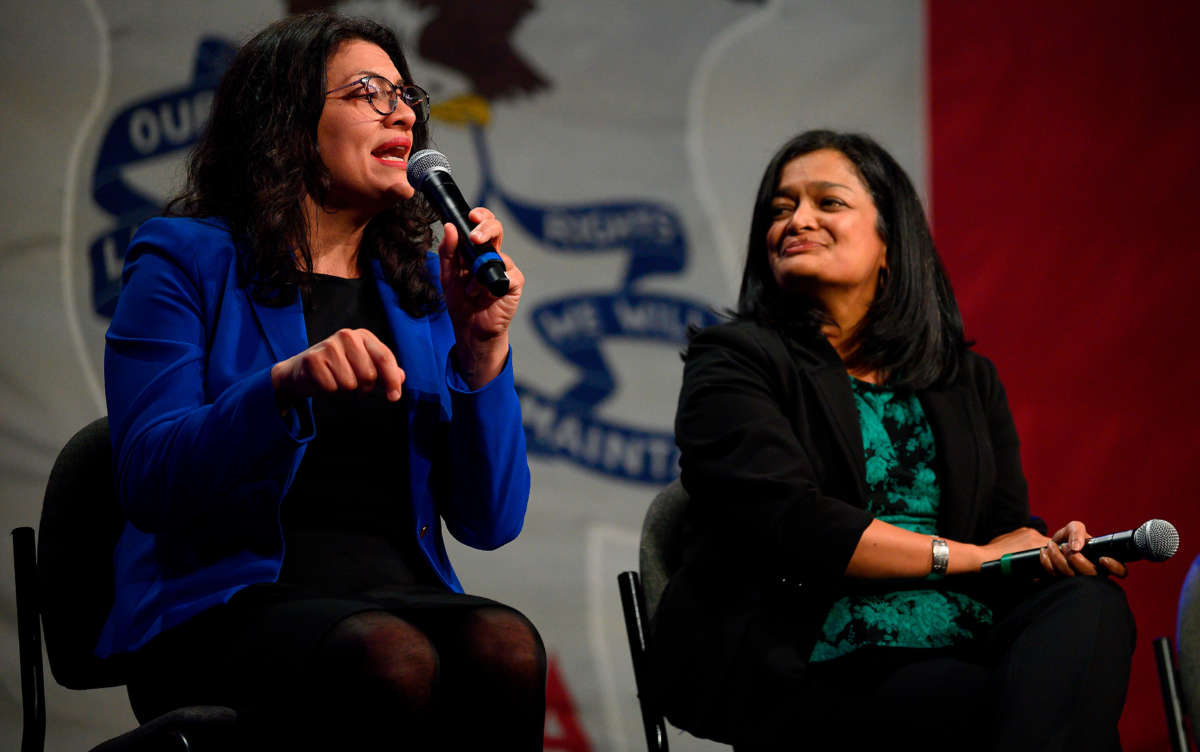On Monday, a group of 27 House representatives sent a letter to House Speaker Nancy Pelosi (D-California) and House Minority Leader Kevin McCarthy (R-California) urging them to pass legislation that would bar Congress from trading stocks.
The letter calls such a ban a “common-sense” move that has the support of both Democrats and Republicans in the chamber. “Both of you have recently addressed this issue in public comments, but this glaring problem will not go away until it is fixed and Congress should not delay when we have the power to fix it,” the letter read.
The effort has rare bipartisan support, with 25 Democrats and two Republicans signing on to the letter. This includes progressives like Representatives Rashida Tlaib (D-Michigan), Katie Porter (D-California) and Pramila Jayapal (D-Washington) as well as Rep. Matt Gaetz (R-Florida) from the far right.
Lawmakers said that any legislation, whether written by Democrats or Republicans, can be brought to the floor, as long as it is done swiftly. They cite Sen. Jon Ossoff’s (D-Georgia) Ban Conflicted Stock Trading Act or Representatives Abigail Spanberger (D-Virginia) and Rep. Chip Roy’s (R-Texas) TRUST in Congress Act that were both introduced recently as bills that could be brought to a vote soon.
Both bills would bar members of Congress and their spouses and dependent children from trading stocks while in office. Aside from certain investments like those in diversified mutual funds or U.S. treasury bonds, portfolios would have to be put in a blind trust.
The letter comes just after Pelosi made a slight heel turn on the issue last week. While she doesn’t “buy into” the issue, she said, the speaker said that she would be open to supporting her caucus if members are in favor of the ban. The Speaker had previously sparked ire when she defended members’ ability to trade stocks, saying that they should be able to participate in the “free market economy.”
McCarthy, who would likely become speaker of the House if Republicans take control of the chamber in the midterm elections, also voiced his support for the issue this month.
As the letter points out, Congress members’ ability to trade stocks is eroding public trust and leads to corruption. Though it is technically illegal for lawmakers to act on nonpublic information to trade stocks, it can be difficult to determine the true cause of certain stock trades.
“The law prohibits only those stock trades that members of Congress make or direct because of their nonpublic knowledge,” the lawmakers wrote, referring to a 2020 stock trading scandal involving several senators making trades after receiving confidential information on the pandemic’s economic effects. “But it can be nearly impossible to determine what counts as ‘nonpublic knowledge’ or how personally involved members are in their stock trades.”
Lawmakers also frequently break the law outright in regards to stock trading disclosures. The 2012 STOCK Act instituted disclosure requirements to increase transparency of Congress members’ stock trades.
But since the penalty for failing to disclose trades on time is small – often just a $200 fine – lawmakers and their staffers have little incentive to report their trades, even when they represent clear conflicts of interest. An investigation last year by Insider found that at least 54 members of Congress have violated the STOCK Act, with many late disclosures being worth upwards of a million dollars.
Regardless of the legality of these actions, the letter writers said that being able to trade stocks distracts lawmakers from doing their job to protect and serve their constituents. “Perhaps this means some of our colleagues will miss out on lucrative investment opportunities. We don’t care,” they wrote. “We came to Congress to serve our country, not turn a quick buck.”
Polling has found that the public also agrees that Congress shouldn’t be allowed to trade stocks. A recent Data for Progress poll found that 74 percent of likely voters support such a ban when presented with arguments for and against the proposal. This includes 75 percent of Democrats, 76 percent of independents and 70 percent of Republicans.
Our most important fundraising appeal of the year
December is the most critical time of year for Truthout, because our nonprofit news is funded almost entirely by individual donations from readers like you. So before you navigate away, we ask that you take just a second to support Truthout with a tax-deductible donation.
This year is a little different. We are up against a far-reaching, wide-scale attack on press freedom coming from the Trump administration. 2025 was a year of frightening censorship, news industry corporate consolidation, and worsening financial conditions for progressive nonprofits across the board.
We can only resist Trump’s agenda by cultivating a strong base of support. The right-wing mediasphere is funded comfortably by billionaire owners and venture capitalist philanthropists. At Truthout, we have you.
We’ve set an ambitious target for our year-end campaign — a goal of $250,000 to keep up our fight against authoritarianism in 2026. Please take a meaningful action in this fight: make a one-time or monthly donation to Truthout before December 31. If you have the means, please dig deep.
